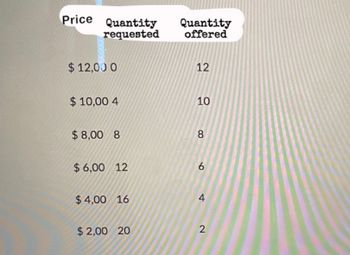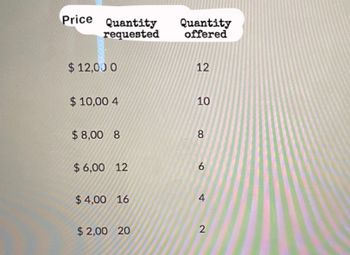
ENGR.ECONOMIC ANALYSIS
14th Edition
ISBN: 9780190931919
Author: NEWNAN
Publisher: Oxford University Press
expand_more
expand_more
format_list_bulleted
Question
27.
Asap please answer!! Give the letter only as the answer.
Refer to the board. At a price of $10.00, the total surplus would be
a) lower than it would be at the equilibrium price .
• b) Higher than it would be at the equilibrium price
• c) the same as it would be at the price of equilibrium
• d) The information provided is insufficient to answer this question

Transcribed Image Text:Price Quantity
requested
30000
$12,00 0
$10,00 4
$8,00 8
$6,00 12
$4,00 16
$2,00 20
Quantity
offered
12
10
8
6
А
2

Transcribed Image Text:Price Quantity
requested
30000
$12,00 0
$10,00 4
$8,00 8
$6,00 12
$4,00 16
$2,00 20
Quantity
offered
12
10
8
6
А
2
Expert Solution
This question has been solved!
Explore an expertly crafted, step-by-step solution for a thorough understanding of key concepts.
Step by stepSolved in 3 steps

Knowledge Booster
Learn more about
Need a deep-dive on the concept behind this application? Look no further. Learn more about this topic, economics and related others by exploring similar questions and additional content below.Similar questions
- 6. The price of the good in the graph below is $5 per unit. Calculate the producers' surplus using the information in Figure 3.3. P $5.00 $3.25 $2.50 11 22 35 S Qarrow_forwardExplain it correctlyarrow_forward18. Just give the letter answer please!!! Refer to the board. At the equilibrium price, the consumer's surplus would be • a) $o b) $ 8 • c) $ 12 • d) $16arrow_forward
- 3. Demand and supply of cigarettes in California are: Supply: Qs = 2Ps + 20 Demand: QD = 200 – PD Calculate the market equilibrium price and quantity, assuming perfect competition. a. b. California decides to tax on cigarettes to fund preschool. It recognizes that a secondary benefit of the tax would be to reduce teen smoking. Suppose taxes of $15 per carton are placed on the consumption of cigarettes. By how much will the tax increase the price consumers pay? By how much will it decrease the price producers receive?arrow_forward8. Consumer and Producer Surplus Suppose Charles is the only seller in the market for bottled water and Yakov is the only buyer. The following lists show the value Yakov places on a bottle of water and the cost Charles incurs to produce each bottle of water: Yakov's Value Value of first bottle: $7 Value of second bottle: $5 Value of third bottle: $3 Value of fourth bottle: $1 Charles's Costs Cost of first bottle: $1 Cost of second bottle: $3 Cost of third bottle: $5 Cost of fourth bottle: $7 The following table shows their respective supply and demand schedules: Price Quantity Demanded Quantity Supplied $1 or less 4 о $1 to $3 3 1 $3 to $5 2 2 $5 to $7 1 3 More than $7 0 4 Use Charles's supply schedule and Yakov's demand schedule to find the quantity supplied and quantity demanded at prices of $2, $4, and $6. Enter these values in the following table. Price Quantity Demanded Quantity Supplied 2 4 A price of brings supply and demand into equilibrium. At the equilibrium price, consumer…arrow_forward2A. Refer to Figure 8-25. What are the equilibrium price and equilibrium quantity in this market? 2B. Refer to Figure 8-25. How much is producer surplus at the market equilibrium? 2C. Refer to Figure 8-25. How much is total surplus at the market equilibrium? Note:- Please refrain from offering handwritten solutions. Please ensure that your response maintains accuracy and quality to avoid receiving a downvote. Take care of plagiarism. Answer completely. You will get up vote for sure.arrow_forward
- 4. Let (inverse) demand be Pb = 99 and (inverse) supply be Pv = 6 + 35 Qv. What price will prevail in the market if it is competitive? Answer: your answer Price ($) $ 3500 $ 3000 $ 2500 $ 2000 $ 1500 $ 1000 $ 500 $0 10 20 Demand 30 Submit 40 Supply 50 60 Eqm 70 80 90 100arrow_forwardTyped plz and Asap Thanksarrow_forward
arrow_back_ios
arrow_forward_ios
Recommended textbooks for you

 Principles of Economics (12th Edition)EconomicsISBN:9780134078779Author:Karl E. Case, Ray C. Fair, Sharon E. OsterPublisher:PEARSON
Principles of Economics (12th Edition)EconomicsISBN:9780134078779Author:Karl E. Case, Ray C. Fair, Sharon E. OsterPublisher:PEARSON Engineering Economy (17th Edition)EconomicsISBN:9780134870069Author:William G. Sullivan, Elin M. Wicks, C. Patrick KoellingPublisher:PEARSON
Engineering Economy (17th Edition)EconomicsISBN:9780134870069Author:William G. Sullivan, Elin M. Wicks, C. Patrick KoellingPublisher:PEARSON Principles of Economics (MindTap Course List)EconomicsISBN:9781305585126Author:N. Gregory MankiwPublisher:Cengage Learning
Principles of Economics (MindTap Course List)EconomicsISBN:9781305585126Author:N. Gregory MankiwPublisher:Cengage Learning Managerial Economics: A Problem Solving ApproachEconomicsISBN:9781337106665Author:Luke M. Froeb, Brian T. McCann, Michael R. Ward, Mike ShorPublisher:Cengage Learning
Managerial Economics: A Problem Solving ApproachEconomicsISBN:9781337106665Author:Luke M. Froeb, Brian T. McCann, Michael R. Ward, Mike ShorPublisher:Cengage Learning Managerial Economics & Business Strategy (Mcgraw-...EconomicsISBN:9781259290619Author:Michael Baye, Jeff PrincePublisher:McGraw-Hill Education
Managerial Economics & Business Strategy (Mcgraw-...EconomicsISBN:9781259290619Author:Michael Baye, Jeff PrincePublisher:McGraw-Hill Education


Principles of Economics (12th Edition)
Economics
ISBN:9780134078779
Author:Karl E. Case, Ray C. Fair, Sharon E. Oster
Publisher:PEARSON

Engineering Economy (17th Edition)
Economics
ISBN:9780134870069
Author:William G. Sullivan, Elin M. Wicks, C. Patrick Koelling
Publisher:PEARSON

Principles of Economics (MindTap Course List)
Economics
ISBN:9781305585126
Author:N. Gregory Mankiw
Publisher:Cengage Learning

Managerial Economics: A Problem Solving Approach
Economics
ISBN:9781337106665
Author:Luke M. Froeb, Brian T. McCann, Michael R. Ward, Mike Shor
Publisher:Cengage Learning

Managerial Economics & Business Strategy (Mcgraw-...
Economics
ISBN:9781259290619
Author:Michael Baye, Jeff Prince
Publisher:McGraw-Hill Education